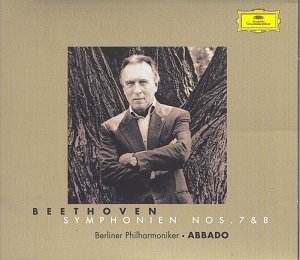Apparently ‘the flourishing tradition of period performance’
is one of the influences on Abbado’s ‘approach to this new Beethoven
cycle’. This is nowadays commonly said of many conductors performing
Beethoven with traditional symphony orchestras. What is almost never
asked or offered as a concomitant reply is precisely how this ‘tradition’
(20 years old) affects the tradition of Beethoven performance (in the
case of the Berlin Philharmonic, 120 years old). Some say observance
of Beethoven’s tempo markings: of course, they are wrong, as listening
to (for instance) Arturo Toscanini’s and Erich Kleiber’s recordings
will quickly demonstrate. Others will point to matters of articulation,
a reduction of legato phrases and domination of string sound. They too
are wrong, as can be shown by recordings of Felix Weingartner.
Certainly, these qualities can be found in Abbado’s
performances of nos.7 and 8, at least irregularly so. Furthermore, they
are rendered in sound so upfront that DG has, at least for me, created
a new kind of home listening experience, though not one I particularly
enjoy. By removing all the perspective which is a normal element of
the standard stage arrangement of an orchestra, DG has painted a sound
picture in which every instrument or section appears to be fixed to
an aural wall instead of decorously arranged on a terrace. I’m not talking
about crude spotlighting of the kind you find on Melodiya recordings,
but a bizarre sense of two-dimensionality which appears to find a close
and disturbing correlative in what Abbado does with these works.
I say ‘appears’ because Abbado live and Abbado on disc
are two different creatures and I can well believe that the symphony
cycles he gave in Berlin, Vienna and Rome around the time of these recordings
(stitched together from concerts, rehearsals and patching sessions:
DG has done well not to call them ‘live’, for all that word implies)
merited the praise they drew. The enormous care he takes to balance
textures and coax the best from an orchestra with an inspiring rather
than insistent conducting technique is often overshadowed on record
by a nagging feeling that he has pinned the butterfly down just a bit
too carefully.
So it proves here. Both symphonies boast a staggering
degree of orchestral virtuosity. Almost no one (Nielsen?) works orchestras
harder than Beethoven and yet nothing in this recording sounds tired.
Beethoven’s varied accent and held note markings are scrupulously observed
in no.7's Allegretto. The woodwind chuckle their way through the Scherzo
with genuine humour, providing one of the few moments of charm on the
whole disc. The strings stand up to Abbado’s fearsome speed for the
ensuing finale admirably, though at a marginally slower tempo (closer
to Beethoven’s marking) Carlos Kleiber gets much more bounce and lift
from the Vienna Philharmonic as well as revealing moments like the bassoon
and pizzicato cello exchanges in bars 67ff with
effortless clarity. But then, Kleiber has sensed a design behind the
notes, a formal scheme that is set in motion by the barely restrained
formality of the first movement’s introduction and is resolved to ultimate
satisfaction in the Presto’s race to the finish. Of such a scheme in
Abbado’s hands there is not a trace.
The Eighth is less successful. His decision to use
reduced forces is nowhere justified: I can see no good reason for it.
Although the woodwind come into even starker prominence, overall clarity
is not increased. The second violin and viola semiquavers against the
rushing upward main theme are inaudible, where in Toscanini’s last recording,
their presence gives a perceptive and exciting instability to that theme:
and this from a mono recording 50 years old. Any hint of interpretative
character has been airbrushed away even more successfully than in the
Seventh. Abbado even manages to rob all tension from the tightening
harmonic screws of the first movement’s development, which is plain
criminal: the reappearance of the exposition loses all its longed-for
release. After refusing to make a ritenuto or rallentando at the end
of almost every other movement in the four symphonies I’ve heard, he
then chooses to do so at the end of this one, where it is most out of
place and spoils Beethoven’s joke.
The hole at the centre of these recordings where personality
should be isn’t a matter of tempo, articulation or dynamics: it is indeed
about ‘approach’. It’s all rather puzzling, for in the booklet note
with the complete set Abbado discusses his admiration for Furtwangler
and reservations about the plain-speaking rigour of Toscanini despite
the opposing attitude of his teacher, Hermann Scherchen. Yet Furtwängler’s
‘visionary’ style of Beethoven performance is as far removed from what
you hear here as you could imagine: Toscanini is a far closer analogue.
Scherchen himself, however, showed that taking Beethoven’s markings
seriously could produce riveting performances, and ones full of individual
character. Some will say that they want their Beethoven to display only
Beethoven’s character. I invite them to listen to this recording, and
to see if they can find it.
Peter Quantrill


